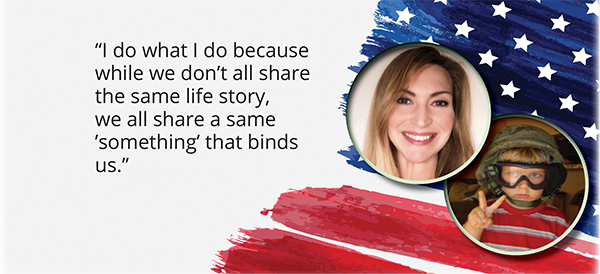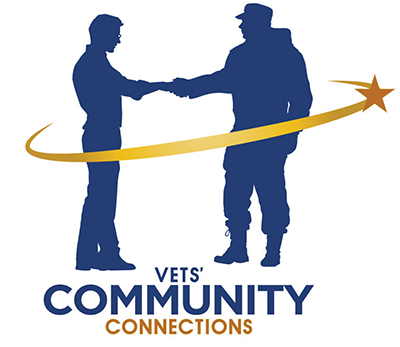
Six moves in twelve years as a military family.
In 1997, I became a Marine Corps spouse and moved for the first of six times from San Diego, my home, to Pensacola, Florida. I left a 6- year career that I’d been building in marketing and production and had no job prospects, contacts, or friends in Florida. We had signed a lease, sight unseen, for a nice Pensacola apartment before leaving San Diego so that when we arrived at our new duty station we would be able to move right in.
Our nice apartment complex was directly behind a strip mall and flanked on the other side by train tracks. It was clean enough, but the area was lacking, and I had wished I’d known before we moved about the other parts of town that were so much more “us”. Had I had any connections to the community or had known anyone there who could have answered some personal questions, it would have made our transfer and ensuing year so much better.
The second move was not as painful. It was a town over, and I had settled in a bit, but was struggling to find a job. There wasn’t much in my field, so I applied for anything that seemed interesting or for which I was remotely qualified or overqualified. After many interviews which always revealed I was a temporary resident due to being a military spouse, and receiving, “thanks but no thanks” I laid it all out there in the next interview; because really what did I have to lose? I like working, I had worked since I was 16, I’m good at what I do, and damn it, someone was going to recognize it, and someone finally did.
It took a little begging and me demonstrating that the boss would be saving money hiring me as I didn’t need “extras “like health insurance… I’ll never forget Trademark Properties; Todd, the owner, for seeing the value in me even though I wouldn’t be there long term and my coworker, Tina Chiapetta (now Grimes), as she was my first true friend on this military spouse journey.
The third move was to Meridian, Mississippi. I’d been a military spouse now for a year and a half, and this move was taking us to base housing. I dove head-first into all things Marine-, spouse- and family- oriented. I became involved as a Key Volunteer (KV) and then the KV Coordinator, VP of the spouses club and unofficial squadron event planner for “carrier qual” and “winging celebrations” and “wetting downs” (promotions). And, since you can’t do everything on base, this took me into the community where I made a lot of connections which led me to an advertising job.
I was in the right place at the right time and got lucky. We also knew we had at least another two years in Meridian, as the training pipeline had been shut down and was backlogged, which I’m sure made it less daunting to hire me. I was busy in Meridian.
The fourth move was back home! Back to San Diego where I had family, friends and job prospects. At least I thought I did. But being out of the local workforce for four years does a number on your relevance. This was also the place where we had our son and the duty station when September 11th occurred.
The world changed in many ways that day and continued to change and become more separated, and being a military family, even more isolated and disconnected.
The fifth move was the hardest – by far. It was to Hawaii. How could you not be excited about Hawaii? At least that’s what my family and friends kept telling me. But this was the move that I most thought about during my interview with Vets’ Community Connections.
Here’s the story: I got on a plane September 6th, 2004: four large suitcases checked, three huge carry-ons and a 3 year old, who did not want to leave home or his grandma and grandpa. It was not a pleasant six- hour flight. My husband was supposed to have been at the airport to meet us, but six days earlier the battalion he was assigned to as a FAC (Forward Air Controller) was told they were deploying to Iraq immediately, not in three months as we had been planning. I literally knew no one getting off that plane. “I’m tough, I’ve been doing this for 7 years, I got this”, I told myself.
But I didn’t.
The base house we were supposed to move into was still occupied because transfers had been put on hold due to the uptick in force deployment. The four crates of household goods I had shipped out seven weeks earlier were now sitting on a dock. I had thirty days to get them moved into a house that did not exist; a rental car that had a cockroach problem (if you’ve lived in Hawaii, you know this isn’t as weird as it sounds); and a small hotel room that had no kitchenette with another 30-day time limit. Despite these sudden hurdles, my son and I were housed, we were financially OK, had food, and we were safe. But we were utterly alone. I have never felt more isolated and detached than I did those first weeks in Paradise.
The base was great for on-base services, but I needed information outside the base and I needed a lot of it: A realtor. School information. A map. Things to do with my son. A chiropractor. I needed someone to talk to that wasn’t entrenched either in the battalion or base information.
I needed a lifeline to the community, some sources I could trust — and I had no idea where to start. We struggled through it, had great neighbors and slowly developed a close connection to the community there by becoming involved with everything we could — but it took a solid year and a half to feel comfortable.
Fast forward to the sixth move back home to San Diego four years later. Then fast forward to eight years of various schooling, jobs. And then to my interview with Vets’ Community Connections in June of 2016. I sat listening to Kari McDonough, co-founder of VCC, describe this new approach to community integration for military and veterans. An idea and mission created to help alleviate the struggles I faced every time we moved to a new community. An avenue for individuals from all walks of life within the San Diego community who want to do more than say, “thanks for your service”. People willing and able to connect directly with people like me and give us access to their local knowledge and experience. A path that provides people like me with easy access to trusted sources to get information specific to our own needs.
Why do I do what I do as Program Director at the San Diego office of Vets’ Community Connections?
I do what I do because while we don’t all share the same life story, we all share a same ’something’ that binds us. Something we’re all looking for – community. And I know Vets’ Community Connections works in connecting veterans, active military and family members like me with real people in the community.
How do I know?
Because I’ve lived it.





